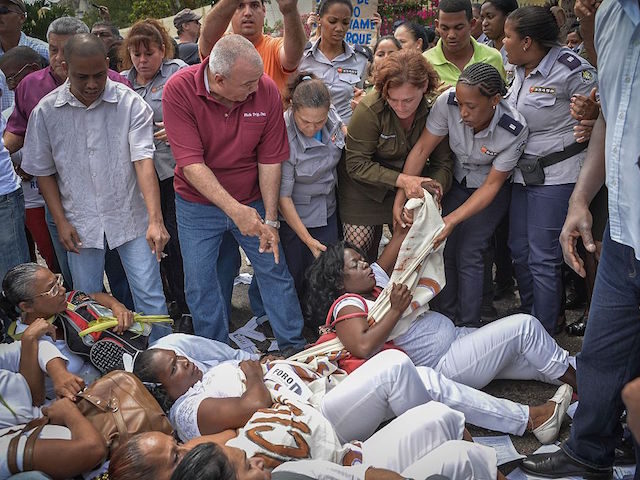A Christian attorney in Cuba levied a complaint against the nation’s Ministry of Culture and government broadcast agency this week for discriminating against people of faith, arguing that a growing number of citizens in the communist country are identifying as Christians and deserve visibility.
The protest, lodged by attorney Miguel Porres, comes at a time in which Cuba has expanded its repressive tactics against Christian pro-democracy groups who use their faith to promote the establishment of a free society and the toppling of the Castro regime.
According to the Spain-based Diario de Cuba, Porres, who comes from a devout family, is working independently to make Christians more visible in the officially atheist Marxist country.
“My objective is to do things within the realm of the law and, if they do not respond, make an administrative demand in Havana’s popular provincial tribunal with the goal of getting them to recognize a space for Christians and equal opportunities for us,” Porres told the outlet.
Before going to the courts with a demand, Porres sent a letter to Culture Minister Abel Prieto and the Cuban Institute of Radio and Television urging them to allow more Christian content to be broadcast in mass media. Porra specifically condemned “discrimination within radio and television cultural practices” against Christians.
“We feel discriminated against by the culture politics of radio and television,” Porra wrote. “Despite the existence of a great variety of excellent quality Christian authors and musicians, this content almost never appears in the media.”
“[Christianity] is part of the history and culture of this nation and of the generations that gave birth to our national identity … we do not represent a fundamentalist idea, we defend the values of Christ, struggle against abuses, immorality, corruption, and delinquency,” Porra, who is not a member of any dissident organization, wrote. “Why, then, can we not count on having a space in the cultural politics of our country?”
Diario de Cuba notes that the Cuban government strives to keep Christianity in the shadows, particularly in light of its growing popularity among dissidents. In contrast, the Lukumí religion, often referred to commonly as santería, does receive representation on popular television, notably with the broadcast of year-end predictions by clergy of the faith.
Christianity is the driving force behind two of the most popular dissident movements on the island: the Ladies in White and the Christian Liberation Movement (MCL). The Ladies in White do not openly profess a Christian message, instead using the practice of their faith, in the form of attending Sunday Mass, as their flagship act of protest. The government arrests dozens of women every Sunday for attempting to attend Mass wearing white and carrying photos of political prisoners – the group was formed by female relatives of political prisoners to demand their release.
This Sunday, Diario de Cuba reported the arrest of twenty ladies in white throughout the country for attempting to practice their religion. Among them was group leader Berta Soler, who has faced arbitrary arrest almost every Sunday since taking over the group in 2011, following the death of founder Laura Pollán. Havana’s Santa Rita church, which the Ladies in White had used as their main place of worship for much of their existence, now bans the women from entering if they are wearing white and holding photos of their imprisoned loved ones.
The Christian Liberation Movement is an organized political movement with a more specific regime change goal than the Ladies in White; while the ladies protest against human rights abuses and demand freedom for political prisoners, the MCL has actively attempted to organize elections and transition the country from a communist dictatorship to a secular free democratic society. Founder Oswaldo Payá was killed by Castro agents in a car crash in Bayamo. His daughter Rosa María has continued his work and organized a boycott of elections in 2017, in which the regime banned all opposition candidates.
The current leader of the MCL, Dr. Eduardo Cardet, was imprisoned in 2016 for allegedly refusing to sign a condolence book for dictator Fidel Castro, who died in November of that year. Cuban authorities sentenced him to three years in prison on unsubstantiated charges of having attacked policemen during the incident in which he refused to write condolences to Castro, a claim eyewitnesses, including his wife, deny.

COMMENTS
Please let us know if you're having issues with commenting.